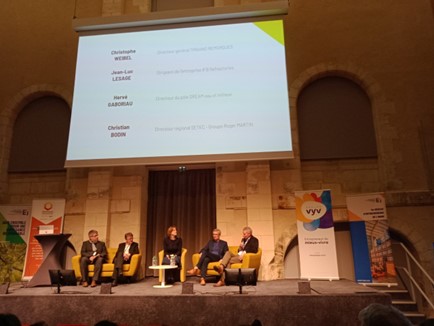The economic landscape has undergone significant changes in recent years. The disruption of globalized supply chains due to the pandemic and geopolitical tensions, along with the climate crisis and the necessity for a more environmentally friendly and sustainable development, have led to questions about the availability of raw materials and natural resources, their sourcing reliability, and their management.
This was the focus of the recent MEDEF Centre-Val de Loire conference on “The Strategic Importance of Raw Materials and Natural Resources,” which included a roundtable discussion with industry leaders including Christophe Webel, CEO of Trigano Remorques, Christian Bodin, Regional Director of Groupe Roger Martin, and Hervé Gaboriau, Director of Pôle DREAM Eau & Milieux and Jean-Luc Lesage, CEO of IFB REFRACTORIES.

During the conference, the CEO of IFB Refractories shared the company’s vision and strategy, highlighting several key points:
1. Awareness
IFB Refractories is a company that specializes in manufacturing Insulating Fire Bricks. It uses natural raw materials such as refractory clays mixed with sawdust, an organic filler from the local circular economy, and water to shape bricks, which are then fired at high temperatures in gas-heated kilns. These products are used in high-temperature processes for producing aluminum, glass, cement, lime, ceramics, and other materials. They provide thermal insulation for many years, resulting in improved energy savings. With a core activity based on the transformation of natural raw materials and by serving other materials industries, IFB Refractories has a deep understanding of the strategic importance of natural resources and the absolute necessity of managing them properly and effectively. Also, running its own quarry provides a sense of reliability in sourcing key raw materials, but it also creates an acute awareness that the sustainability of the business is linked to the efficient usage of this resource.
2. History
IFB Refractories was founded in 1919 in the Centre-Val de Loire Region. At that time, transportation, energy, and water resources were less abundant than today. Therefore, the plant was located near the required natural raw materials, which were the refractory clay basin of Limoges and oak tree forests, thereby eliminating the need for long supply chains. To compensate for limited water resources, raw materials were stored outside for weeks to capture as much rainwater as possible, reducing the use of piped water. Additionally, the company used time to reduce the amount of necessary energy by letting the batches rest for a certain time before shaping the bricks. This process provided the necessary homogeneity and particle cohesion to avoid high-energy mixing. As a labeled living heritage company, IFB Refractories has remained loyal to its historical processes, which are continuously fine-tuned to preserve materials, water, and energy. In a sense, the company has been involved in Corporate Social Responsibility since its inception.
3. Best practices
At IFB Refractories, recycling has been elevated to the status of an industrial religion. It has been incorporated into all internal processes, such as the shaping step, which can ultimately process 100% of the raw material without losses. At the machining step, dust is carefully collected to be reintroduced into the mixture batch, reducing the amount of required raw materials. During the final quality check, products rejected due to aesthetic flaws are re-machined into smaller shapes to avoid unnecessary material losses. Ultimately, non-sellable products are ground for other uses, such as manufacturing insulating concretes and cements. Over the years, these best practices have been reinforced with continuous improvement methods like “LEAN” and “KAIZEN” and embedded in the Corporate Social Responsibility strategy.
4. Innovation
IFB Refractories has its own laboratory and research team. Given the size of the company, incremental research is favored. Research projects cover different topics, such as increasing insulation performance or compatibility with new and reinforced specifications. Recycling also remains an important innovation topic. For example, we are currently exploring new possibilities for external recycling and innovative ways to valorize rejected materials.
5. Communication
As a medium-sized company, IFB Refractories offers to all employees first-hand experiences with various crucial aspects of the industrial life. For instance, successfully recycling more raw materials or, on the contrary, having to switch to pipe water when the rainwater reserve runs dry are concrete examples of daily shopfloor actions linked to our efforts to contribute to a more sustainable future. Although key performance indicators are essential for long-term improvement and official certifications, they also provide solid evidence of our dedication to more sustainability. As an example, over the last 2 years IFB REFRACTORIES has reduced its water consumption year-over-year by 15% and its energy consumption by 22%, while increasing its internal recycling at a level of 68%.
This instils confidence in loyal clients who prioritize environmentally-friendly, 100% made in France products over cheaper and non-sustainable alternatives.